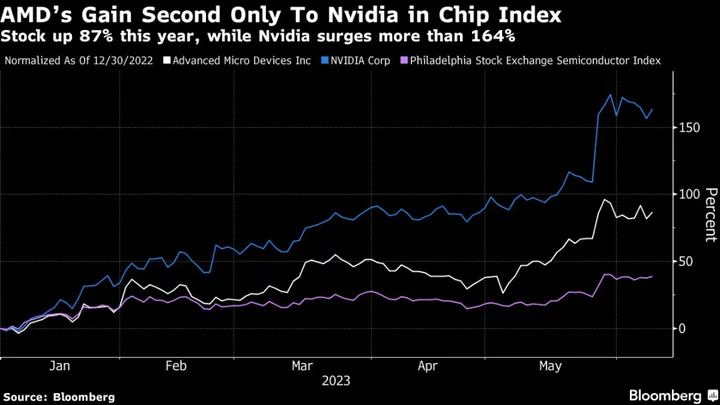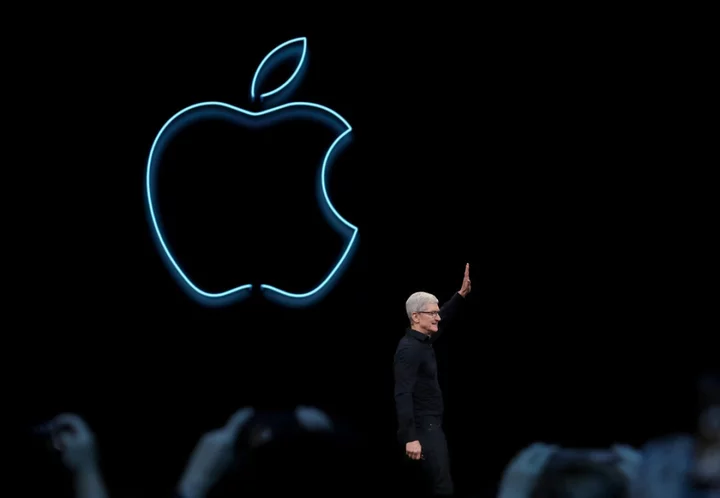Advanced Micro Devices Inc.’s stellar share-price performance this year reflects its place in the eyes of investors looking to make an artificial intelligence trade: the best backup plan.
The stock’s 87% surge would make it the top performer on the Philadelphia Stock Exchange Semiconductor Index if it wasn’t for the stratospheric gain of rival Nvidia Corp. Nvidia briefly became the first chipmaker to have a trillion-dollar market value after delivering concrete evidence that the rush to develop new AI services is translating into a surge in orders for hardware.
AMD gets its shot to prove it’s also a player in AI computing on Tuesday when executives introduce new data center chips at an event in San Francisco. Investors will get a peek at its Epyc processor aimed at cloud computing, but they’ll likely be more focused on the forthcoming MI300, a purported rival to the H100 from Nvidia that’s at the heart of that company’s strong position.
“AMD’s strategy is to be a one-stop data center chipmaker,” said Carl Hazeley, senior analyst at Finimize Ltd., an investing insights platform owned by Abrdn Plc. “As to whether AMD could be successful in competing with Nvidia, it basically comes down to waiting and seeing — and maybe buying both AMD and Nvidia.”
The stock’s rally assumes that AMD is poised to grab part of what Nvidia Chief Executive Officer Jensen Huang says is the need to replace $1 trillion of data-center hardware worldwide with gear more suited to AI computing.
So far, investors have given it the benefit of the doubt on that score, briefly pushing its market value to more than $200 billion. A key attraction for them is that the stock is far cheaper than Nvidia, trading at 7.8 times projected sales for the next 12 months, less than half its rival’s 20 times, according to data compiled by Bloomberg.
Analysts are more circumspect, preferring to wait for AMD to show them how it’s going to make money from the technology. Their aggregate price target is 11% below the last close.
One warning sign, according to Morgan Stanley analyst Joseph Moore, is that AMD’s server business remains sluggish. That indicates the firm is one of a group of companies whose “current portfolios are not a meaningful beneficiary of the AI surge, even though it is helping portions of their business,” he wrote in a research note.
How long AMD has to deliver the goods remains to be seen. In recent years, the company has taken on Intel Corp., carving out 18% of the server market, one of the most lucrative areas of the semiconductor industry. However, the battle with Nvidia for a slice of AI-driven sales won’t be easy, said Richard Clode, a portfolio manager with Janus Henderson.
“Nvidia is executing pretty flawlessly, so it’s a much tougher competitor for AMD than Intel was,” Clode said.
Tech Chart of the Day
Microsoft Corp. hasn’t missed out on this year’s rally in mega-cap technology stocks, rising 36% to within sight of a record. Gains have been turbocharged in recent months as the maker of Windows software races peers like Alphabet Inc. to introduce generative AI features onto its suite of products and services. The company is overhauling its entire lineup of Office apps, including Excel, PowerPoint, Outlook and Word, with OpenAI technology.
Top Tech Stories
- The AI frenzy that has driven massive inflows into tech stocks is marking a pause, Bank of America Corp. says. Tech funds sustained $1.2 billion of outflows in the week through June 7, their first in eight weeks, according to the bank, citing EPFR Global data.
- Generative AI could transform society — but the human biases the technology can amplify may do more harm than just perpetuating stereotypes.
- Taiwan Semiconductor Manufacturing Co.’s monthly revenue fell again in May after consumers and corporations cut spending on electronics.
- Meta Platforms Inc. Chief Executive Officer Mark Zuckerberg sought to reassure employees about the company’s strategy, especially its emphasis on artificial intelligence, just two weeks after it finished the latest round of job cuts.
- ByteDance Ltd. is testing an artificial intelligence-powered chatbot among employees, joining rival Chinese internet conglomerates from Alibaba Group Holding Ltd. to Baidu Inc. in a race to create a local version of ChatGPT.
- Google employees are pushing back against the tech giant’s mandate that staffers spend at least three days a week in the office.
--With assistance from Henry Ren.









